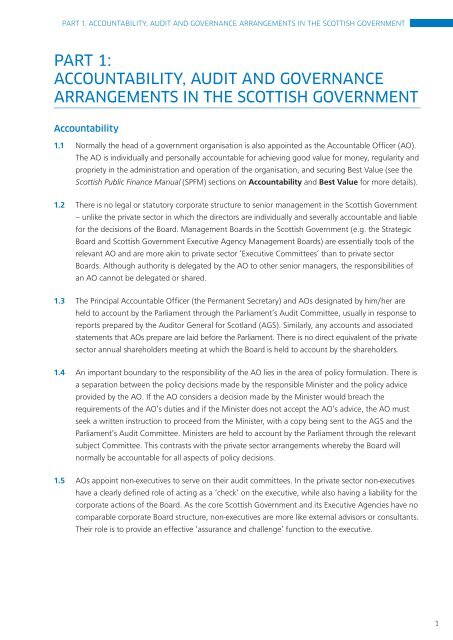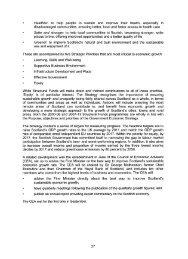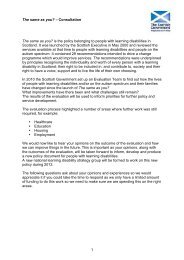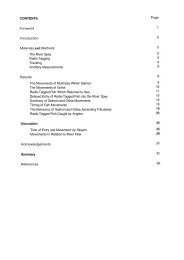Audit Committee Handbook - Scottish Government
Audit Committee Handbook - Scottish Government
Audit Committee Handbook - Scottish Government
Create successful ePaper yourself
Turn your PDF publications into a flip-book with our unique Google optimized e-Paper software.
PART 1. ACCOUNTABILITY, AUDIT AND GOVERNANCE ARRANGEMENTS IN THE SCOTTISH GOVERNMENT<br />
PART 1:<br />
ACCOUNTABILITY, AUDIT AND GOVERNANCE<br />
ARRANGEMENTS IN THE SCOTTISH GOVERNMENT<br />
Accountability<br />
1.1 Normally the head of a government organisation is also appointed as the Accountable Officer (AO).<br />
The AO is individually and personally accountable for achieving good value for money, regularity and<br />
propriety in the administration and operation of the organisation, and securing Best Value (see the<br />
<strong>Scottish</strong> Public Finance Manual (SPFM) sections on Accountability and Best Value for more details).<br />
1.2 There is no legal or statutory corporate structure to senior management in the <strong>Scottish</strong> <strong>Government</strong><br />
– unlike the private sector in which the directors are individually and severally accountable and liable<br />
for the decisions of the Board. Management Boards in the <strong>Scottish</strong> <strong>Government</strong> (e.g. the Strategic<br />
Board and <strong>Scottish</strong> <strong>Government</strong> Executive Agency Management Boards) are essentially tools of the<br />
relevant AO and are more akin to private sector ‘Executive <strong>Committee</strong>s’ than to private sector<br />
Boards. Although authority is delegated by the AO to other senior managers, the responsibilities of<br />
an AO cannot be delegated or shared.<br />
1.3 The Principal Accountable Officer (the Permanent Secretary) and AOs designated by him/her are<br />
held to account by the Parliament through the Parliament’s <strong>Audit</strong> <strong>Committee</strong>, usually in response to<br />
reports prepared by the <strong>Audit</strong>or General for Scotland (AGS). Similarly, any accounts and associated<br />
statements that AOs prepare are laid before the Parliament. There is no direct equivalent of the private<br />
sector annual shareholders meeting at which the Board is held to account by the shareholders.<br />
1.4 An important boundary to the responsibility of the AO lies in the area of policy formulation. There is<br />
a separation between the policy decisions made by the responsible Minister and the policy advice<br />
provided by the AO. If the AO considers a decision made by the Minister would breach the<br />
requirements of the AO’s duties and if the Minister does not accept the AO’s advice, the AO must<br />
seek a written instruction to proceed from the Minister, with a copy being sent to the AGS and the<br />
Parliament’s <strong>Audit</strong> <strong>Committee</strong>. Ministers are held to account by the Parliament through the relevant<br />
subject <strong>Committee</strong>. This contrasts with the private sector arrangements whereby the Board will<br />
normally be accountable for all aspects of policy decisions.<br />
1.5 AOs appoint non-executives to serve on their audit committees. In the private sector non-executives<br />
have a clearly defined role of acting as a ‘check’ on the executive, while also having a liability for the<br />
corporate actions of the Board. As the core <strong>Scottish</strong> <strong>Government</strong> and its Executive Agencies have no<br />
comparable corporate Board structure, non-executives are more like external advisors or consultants.<br />
Their role is to provide an effective ‘assurance and challenge’ function to the executive.<br />
1

















